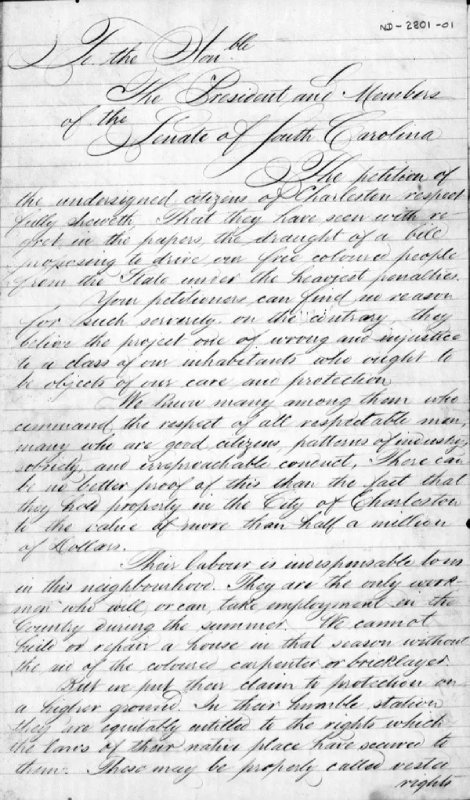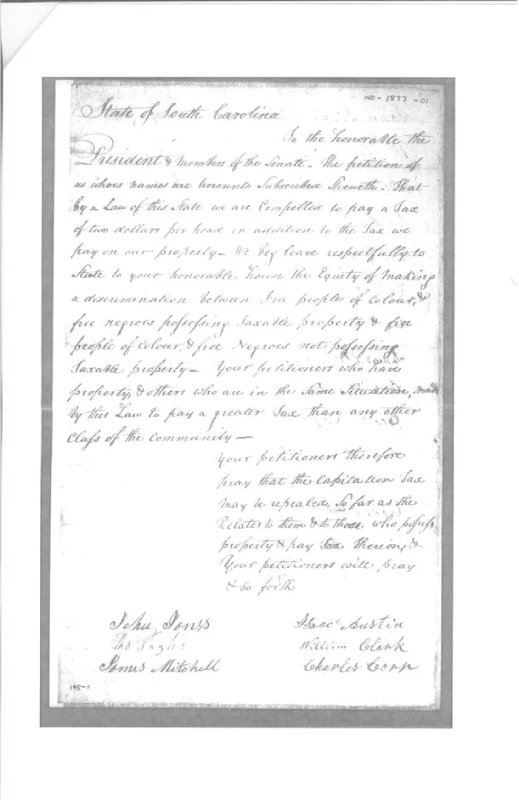Protected Documents
A petition was written by the Charleston Memorials to prevent free blacks from learning to read and write, however most whites tolerated the schools if they were kept out of sight. These schools increased after the Revolutionary War.
To the Honorable. The President and members of the Senate.
The Memorials of the council of Charleston respectfully sheweth that the Grand Jury of Charleston District have presented the number of schools publicly kept for the institution of persons of colour in reading and writing…This law prohibits slaves being taught to write. The facilities however that are afforded them by the means of schools professedly kept for the instruction of free persons of colour, will soon render this knowledge very common in our community. It is impossible to distinguish between the free and the slave of our coloured population and therefore it is extremely difficult to detect violation of this law…
Source: South Carolina Department of Archives and History.
The South Carolina Mechanics Association of carpenters and bricklayers petitioned the courts for a resolution to compete with the low prices free blacks charged for their services.
To the Honorable the Senate and House of Representatives in General Assembly.
The humble Petition of the South Carolina Mechanics Association.
…your petitioners would further request that your Honorable body would take with consideration the class of negroes known amongst us as free negroes and that a tax be imposed upon them or that some remedy be made that shall at least place us in such a position that we may be able to compete with them, if they are to be on an equality with us. And your petitioners will ever pray and so forth.
Source: South Carolina Department of Archives and History.
A petition was written by white citizens who wanted free blacks to continue living in the state. Free blacks owned property worth more than half a million dollars in Charleston, SC according to tax records.
The petition of the undersigned citizens of Charleston respectfully sheweth(show). That they have seen with regret in the papers the draught of a bill professing to drive out free coloured people from the state…
Your petitioners can find no reason for such severity on the contrary they believe the project one of wrong and injustice to a class of inhabitants who ought to be objects of our care and protection.
We perceive prose many among them who command the respect of all respectable men, many who are good citizens…
There can be no better proof of this than the fact that they hold property in the city of Charleston to the value of more than half a million of dollars.
Their laborer …to us in this neighborhood. They are the only workmen who will or can take employment in the county during the summer. We cannot build or repair a house in that season without the use of the coloured carpenter or bricklayer…
Source: South Carolina Department of Archives and History.
Free blacks signed a petition that opposed paying both capitation taxes and property taxes. They wanted the capitation tax that began in 1792 to be repealed since white citizens were not required to pay additional taxes.
State of South Carolina,
To the honorable the President and members of the Senate. The petition of whose names are hereunto subscribed sheweth. That by a law of this state we are compelled to pay a tax of two dollars per head in addition to the tax we pay on our property. We beg leave respectfully to state to your honorable house the equity of making a discrimination between free people of color, free negroes possessing taxable property and for free people of color and free negroes not possessing taxable property. Your petitioners who have property, and others who are in the same situation, made by this law to pay a greater tax than any other class of the community. Your petitioners therefore pray that the capitation tax may be repealed, so far as this relates to them who possess property and pay tax there on. Your petitioners will pray so forth.
1809
Source: South Carolina Department of Archives and History.



